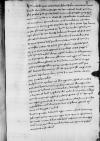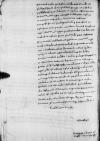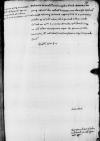Ut hic instans annus Reverendissimae Dominationis Vestrae felix faustusque sit, precor. Bonum omen mihi scripsit reverendissimus Mauritius Ferber (*1471 – †1537), doctor of both canon and civil law; from 1507 Canon of Ermland (Warmia) and Lübeck; from 1514 Canon of Trier; 1512-1515 parish priest of the Church of Saints Peter and Paul in Gdańsk (Danzig); from 1516 Custos of Ermland and parish priest of the Church of the Blessed Virgin Mary in Gdańsk; from 1519 Canon of Dorpat; from 1523 Canon of Revel; 1523-1537 Bishop of Ermland (KOPICZKO 2, p. 71-72; SBKW, p. 59-60)⌊episcopus WarmiensisMauritius Ferber (*1471 – †1537), doctor of both canon and civil law; from 1507 Canon of Ermland (Warmia) and Lübeck; from 1514 Canon of Trier; 1512-1515 parish priest of the Church of Saints Peter and Paul in Gdańsk (Danzig); from 1516 Custos of Ermland and parish priest of the Church of the Blessed Virgin Mary in Gdańsk; from 1519 Canon of Dorpat; from 1523 Canon of Revel; 1523-1537 Bishop of Ermland (KOPICZKO 2, p. 71-72; SBKW, p. 59-60)⌋ Reverendissimam Dominationem Vestram electam esse capitulariter in coadiutorem cum successione, quamvis, ut dicitur, quidam recalcitrare nituntur, sed maior et sanior pars praecedet. Ego hilari fronte legi litteras et statim felicitatem precatus sum.
Reverendissime domine, scribo in praesens reverendissimo Jan Chojeński (*1486 – †1538), 1523 royal secretary, 1526-1537 Grand Secretary; 1531-1535 Bishop of Przemyśl, 1535-1537 Bishop of Płock, 1537-1538 Bishop of Cracow, 1537-1538 Grand Chancellor of the Crown (WYCZAŃSKI 1990, p. 248-249; PSB 3, p. 396-399)⌊episcopo PlocensiJan Chojeński (*1486 – †1538), 1523 royal secretary, 1526-1537 Grand Secretary; 1531-1535 Bishop of Przemyśl, 1535-1537 Bishop of Płock, 1537-1538 Bishop of Cracow, 1537-1538 Grand Chancellor of the Crown (WYCZAŃSKI 1990, p. 248-249; PSB 3, p. 396-399)⌋, ut qui hucusque habenas direxerit. Est spes unum sibi officium committi vel cancellariatus, vel vicecancellariatus. Et quia oportuit litteras secundario scribere, visum est Reverendissimae Dominationi Vestrae exemplar mittere, ut quando cum reverendissimo Plocensi conferendum foret, ut Paternitas Vestra sciat, quid optaverim et in quibus causis scripserim. Velim Reverendissimam Dominationem Vestram obnixe rogatam habere, ne velit gravari ea, quae scripsi de filio meo, sollicitare coram regia maiestate una cum domino Achatius von Zehmen (Achacy Cema) (*ca. 1485 – †1565), 1517-1531 Chamberlain of Pomerania, 1531-1546 Castellan of Gdańsk (Danzig), 1545-1546 Voivode of Kulm (Chełmno), 1546-1565 Voivode of Marienburg (Malbork) (SBPN 1, p. 194-195; ORACKI 1984, p. 38-39; Urzędnicy 5/2, p. 198; PSB 4, p. 325-326)⌊castellano GdanensiAchatius von Zehmen (Achacy Cema) (*ca. 1485 – †1565), 1517-1531 Chamberlain of Pomerania, 1531-1546 Castellan of Gdańsk (Danzig), 1545-1546 Voivode of Kulm (Chełmno), 1546-1565 Voivode of Marienburg (Malbork) (SBPN 1, p. 194-195; ORACKI 1984, p. 38-39; Urzędnicy 5/2, p. 198; PSB 4, p. 325-326)⌋ et domino Johann von Werden (Constellatus, cf. HE, No. 148, p. 150, footnote No. 12) (*1495 – †1554), 1526 Mayor of Gdańsk (Danzig), from 1527 Starost of Neuenburg (Nowe), 1532-1535, 1538, 1539, 1546, 1551 Burgrave of Gdańsk, from 1535 Starost of Preußisch Mark (Przezmark) (1535-1540 together with Achatius von Zehmen (Cema)), 1536/1537 envoy of the Council of Royal Prussia to the Diet of the Kingdom of Poland held in Cracow (SBPN 4, p. 433-435; ZDRENKA 2, p. 368-369; MAŁŁEK 1976, p. 93, 161)⌊Ioanne a WerdumJohann von Werden (Constellatus, cf. HE, No. 148, p. 150, footnote No. 12) (*1495 – †1554), 1526 Mayor of Gdańsk (Danzig), from 1527 Starost of Neuenburg (Nowe), 1532-1535, 1538, 1539, 1546, 1551 Burgrave of Gdańsk, from 1535 Starost of Preußisch Mark (Przezmark) (1535-1540 together with Achatius von Zehmen (Cema)), 1536/1537 envoy of the Council of Royal Prussia to the Diet of the Kingdom of Poland held in Cracow (SBPN 4, p. 433-435; ZDRENKA 2, p. 368-369; MAŁŁEK 1976, p. 93, 161)⌋ etc. Scripsi etiam in ea causa illustrissimo Albrecht I von Hohenzollern-Ansbach (Albrecht von Brandenburg) (*1490 – †1568), 1511-1525 Grand Master of the Teutonic Order; from 1525 to his death Duke in Prussia as a liegeman of the Polish king; son of Friedrich V of Brandenburg der Ältere and Sophia Jagiellon (daughter of Casimir IV Jagiellon), nephew of Sigismund I, King of Poland; founder of the university in Königsberg (1544)⌊principi PrussiaeAlbrecht I von Hohenzollern-Ansbach (Albrecht von Brandenburg) (*1490 – †1568), 1511-1525 Grand Master of the Teutonic Order; from 1525 to his death Duke in Prussia as a liegeman of the Polish king; son of Friedrich V of Brandenburg der Ältere and Sophia Jagiellon (daughter of Casimir IV Jagiellon), nephew of Sigismund I, King of Poland; founder of the university in Königsberg (1544)⌋, si forte, ut dicitur, sua illustrissima dominatio illic Cracow (Kraków, Cracovia), city in southern Poland, Małopolska, on the Vistula river, from 1038 capital of the Kingdom of Poland⌊CracoviaeCracow (Kraków, Cracovia), city in southern Poland, Małopolska, on the Vistula river, from 1038 capital of the Kingdom of Poland⌋ est, et spero suam illustritatem non gravate facturam. Spe bona alor Reverendissimam Dominationem Vestram mei intuitu non recusare onus hoc subire.
Anhelo scire, qualiter res illic agantur, praesertim cum nuntiis districtuum harum terrarum, qualiter res eorum illic conspiciuntur. Aestimo, quod habeant promotoriales a domino Kostka etc., qui auctor et director est huius tragoediae, et illum quidam alii sequuntur. Collega Reverendissimae Dominationis Vestrae tametsi negat, sed multum suspectus est etc. Ego apud me cogito grave fuisse Dominationi Vestrae nesciens, cui fidat seu cui se credat. Refocillabitur autem adveniente domino Achatius von Zehmen (Achacy Cema) (*ca. 1485 – †1565), 1517-1531 Chamberlain of Pomerania, 1531-1546 Castellan of Gdańsk (Danzig), 1545-1546 Voivode of Kulm (Chełmno), 1546-1565 Voivode of Marienburg (Malbork) (SBPN 1, p. 194-195; ORACKI 1984, p. 38-39; Urzędnicy 5/2, p. 198; PSB 4, p. 325-326)⌊castellano GdanensiAchatius von Zehmen (Achacy Cema) (*ca. 1485 – †1565), 1517-1531 Chamberlain of Pomerania, 1531-1546 Castellan of Gdańsk (Danzig), 1545-1546 Voivode of Kulm (Chełmno), 1546-1565 Voivode of Marienburg (Malbork) (SBPN 1, p. 194-195; ORACKI 1984, p. 38-39; Urzędnicy 5/2, p. 198; PSB 4, p. 325-326)⌋ etc. Deus omnia derigat in melius.
Dicitu, quod nuntii districtuum regni acriter instant has terras sub iugum ponere, ut onera regni nos aeque ac ipsi feramus. Haec causa merito deberet nobilitatem nostram terrere, ut resipiscerent, ne se gravibus oneribus subiciant, quae ferri non possunt nec patres nostri tulerunt.
 AAWO, AB, D.5, f. 11v
AAWO, AB, D.5, f. 11v
Primores nostri pro iustitia et libertate favenda, ut privilegium sonat, ab iniustis dominis se Sigismund I Jagiellon (Zygmunt I) (*1467 – †1548), King of Poland and Grand Duke of Lithuania (1506-1548); Duke of Głogów (Glogau) (1499-1506), Duke of Opava (1501-1506), Governor of Silesia (1504-1506); son of King Kazimierz IV Jagiellon and Elisabeth of Austria⌊regiSigismund I Jagiellon (Zygmunt I) (*1467 – †1548), King of Poland and Grand Duke of Lithuania (1506-1548); Duke of Głogów (Glogau) (1499-1506), Duke of Opava (1501-1506), Governor of Silesia (1504-1506); son of King Kazimierz IV Jagiellon and Elisabeth of Austria⌋, ut iusto domino, se subdiderunt, quo in libertate et iustitia conservarentur. Et serenissima Sigismund I Jagiellon (Zygmunt I) (*1467 – †1548), King of Poland and Grand Duke of Lithuania (1506-1548); Duke of Głogów (Glogau) (1499-1506), Duke of Opava (1501-1506), Governor of Silesia (1504-1506); son of King Kazimierz IV Jagiellon and Elisabeth of Austria⌊maiestas regiaSigismund I Jagiellon (Zygmunt I) (*1467 – †1548), King of Poland and Grand Duke of Lithuania (1506-1548); Duke of Głogów (Glogau) (1499-1506), Duke of Opava (1501-1506), Governor of Silesia (1504-1506); son of King Kazimierz IV Jagiellon and Elisabeth of Austria⌋ inscripsit in libertate, iustitia et antiqua consuetudine has terras conservare.
Iam passim fere omnia privilegia sonant, quod sint astricti pro defensione terrae Prussia, region in central Europe, bordered by Pomerania, Poland, Lithuania and Livonia. From 1466 Prussia was divided into Royal Prussia (Prussia Regalis), which was a part of the Kingdom of Poland, and Teutonic Prussia (Prussia Ordinis Theutonici) – covering the remnants of the former territory of the Teutonic Order’s state in Prussia. In 1525, the Order’s last Grand Master, Albrecht von Hohenzollern, converted to Lutheranism and became the first lay duke in former Teutonic Prussia (dux in Prussia), which from then on was called Ducal Prussia (Prussia Ducalis). At that time, as a result of the treaty of Cracow, Ducal Prussia became a fief of the kings of Poland⌊PrussiaePrussia, region in central Europe, bordered by Pomerania, Poland, Lithuania and Livonia. From 1466 Prussia was divided into Royal Prussia (Prussia Regalis), which was a part of the Kingdom of Poland, and Teutonic Prussia (Prussia Ordinis Theutonici) – covering the remnants of the former territory of the Teutonic Order’s state in Prussia. In 1525, the Order’s last Grand Master, Albrecht von Hohenzollern, converted to Lutheranism and became the first lay duke in former Teutonic Prussia (dux in Prussia), which from then on was called Ducal Prussia (Prussia Ducalis). At that time, as a result of the treaty of Cracow, Ducal Prussia became a fief of the kings of Poland⌋ nec ultra limites. Confidimus ergo in serenissima Sigismund I Jagiellon (Zygmunt I) (*1467 – †1548), King of Poland and Grand Duke of Lithuania (1506-1548); Duke of Głogów (Glogau) (1499-1506), Duke of Opava (1501-1506), Governor of Silesia (1504-1506); son of King Kazimierz IV Jagiellon and Elisabeth of Austria⌊maiestate regiaSigismund I Jagiellon (Zygmunt I) (*1467 – †1548), King of Poland and Grand Duke of Lithuania (1506-1548); Duke of Głogów (Glogau) (1499-1506), Duke of Opava (1501-1506), Governor of Silesia (1504-1506); son of King Kazimierz IV Jagiellon and Elisabeth of Austria⌋, quod nos servabit in ea libertate, iuribus et iustitia, prout serenissimus olim pater et fratres servaverunt. Subditos nos profitemur serenissimorum regum, dominos autem Polonos pro fratribus rogantes, ne velint nos in iuribus nostris, libertate et iustitia impedire, quin immo nobiscum regiam celsitudinem rogatam habere, quo sua maiestas quemlibet in suo iure, privilegio, praerogativa ac consuetudine conservare dignetur. Onera autem regni portare non est in posse nostro, nec relevaret in aliquo incolas regni, solum quidem calumniam nostram riderent, quam The Prussians ⌊incolae PrussiaeThe Prussians ⌋ deplangerent. Attamen The Prussians ⌊incolae PrussiaeThe Prussians ⌋ sunt proni ac benevoli Sigismund I Jagiellon (Zygmunt I) (*1467 – †1548), King of Poland and Grand Duke of Lithuania (1506-1548); Duke of Głogów (Glogau) (1499-1506), Duke of Opava (1501-1506), Governor of Silesia (1504-1506); son of King Kazimierz IV Jagiellon and Elisabeth of Austria⌊maiestati regiaeSigismund I Jagiellon (Zygmunt I) (*1467 – †1548), King of Poland and Grand Duke of Lithuania (1506-1548); Duke of Głogów (Glogau) (1499-1506), Duke of Opava (1501-1506), Governor of Silesia (1504-1506); son of King Kazimierz IV Jagiellon and Elisabeth of Austria⌋ inservire et, ubi res expostulare videbitur, contributiones non negare et pronunc opera nostra spectata erat, nisi quidam obstetissent, qui nobilitatem alio deflexerint cum detrimento Poland (Kingdom of Poland, Polonia)⌊rei publicaePoland (Kingdom of Poland, Polonia)⌋ et sui ipsius, non tamen volunt esse culpabiles etc.
Cum his me servitiaque mea Reverendissimae Dominationi Vestrae commendata esse cupio.
 AAWO, AB, D.5, f. 1v unnumbered after f. 11
AAWO, AB, D.5, f. 1v unnumbered after f. 11



